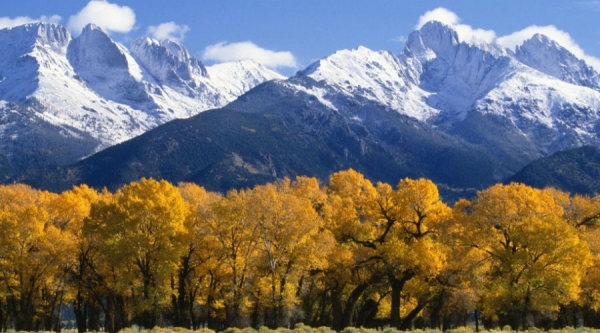For school students, it means the chance of benefiting from the long-standing tradition of the "snow day", when schools are forced to close and students get an unexpected day off.
It's a familiar theme from American film and TV shows, with children getting the good news and then running outside for some seasonal snowman-building and snowball throwing, against a montage of Eighties pop music.
But the tradition is now over for pupils in US states such as South Carolina, Nevada, Georgia and Indiana.
This academic year, many school boards have introduced policies which require students to work from home if the school is shut by snow or extreme weather.
They are known as "e-learning days", which certainly sounds less fun than a snow day.
'Let the kids enjoy it'
Teachers are also losing their snow days and instead will be expected to be on hand to take a virtual register and answer students' questions online.
A pilot programme in a school district in Anderson County, South Carolina has supplied students with electronic tablets loaded with assignments to complete in the event of a school closure.
If it is successful, it could be rolled out across the state.
But some parents object to the new policy, if the vigorous debate on the Facebook page of Anderson County school district is anything to go by.
"When it snows, let the kids enjoy it," said one commenter.
Another said the decision would "ruin school even more", and someone else called snow days "a fun part of childhood".
But proponents of the policy say it means children will miss fewer days of school.
It will also bring to an end a less popular US high school tradition: the "make-up day", which requires students in many states to make up the time lost due to weather by working during school holidays.
- Snow school closures 'do not harm learning', says Harvard study
- 10 things about school snow closures
- In pictures: Heavy snow falls in the US
Students in North Carolina already have several make-up days scheduled because of school closures during Hurricane Florence, which struck in September.
Tom Wilson, the superintendent of Anderson County school district, said the change away from snow days makes practical and financial sense.
He said technology has changed every profession, so it makes sense to use it to "eliminate" make-up days.
Not a replacement
Adam Baker of the Department of Education in Indiana said e-learning days were proving a "great success".
He said most Indiana schools already use digital devices during lessons, so it was an "easy decision" to extend this to days when schools are closed.
He denies the decision is depriving children of the chance to enjoy the snow.
"Students are still able to enjoy snow days and outside time," he said. "Many have PE and science assignments that have them out enjoying the weather."
But local school superintendents in Ohio are resisting proposals to adopt e-learning days.
They fear that students without internet access at home will be disadvantaged by the policy, and superintendent Tom Roth is concerned that e-learning days will offer a lower quality of education.
There are also so-called "blizzard bags", with assignments that are sent home with children ahead of an expected snow closure.
But Mr Roth says it is not sufficient as a replacement.
"I think we still need the class time to give our kids the education that they deserve," he said.
"You can't get that with a blizzard bag or doing the work from home like that. It's not going to be as effective."
Do days off matter?
There is a long-running debate on whether missing days of school affects attainment.
In England, where the focus has been on tackling truancy, the Department for Education published research in 2016 arguing that missing any days at school could have a negative impact on results.
Even a few days lost in a year could be enough to miss out on getting a good exam grade, the DFE's research concluded.
This differed from the findings of a study from Harvard University in the US, which concluded that missing a few occasional days because of the weather did not damage learning.
The study examined seven years of school results data and could not find any impact from snow closures.
What caused more disruption was when schools tried to stay open in bad weather, even though many staff and pupils were absent.
But weather can make a difference to school results, according to another piece of Harvard research published last summer.
It's hot weather that has the negative impact. The results of 10 million school students were examined over 13 years and researchers found a "significant" link between years with sweltering weather and lower results.








